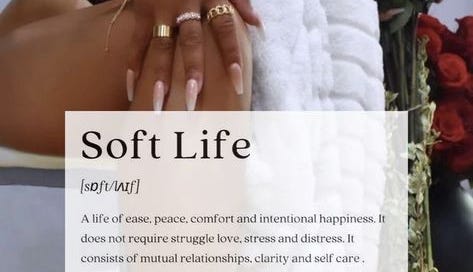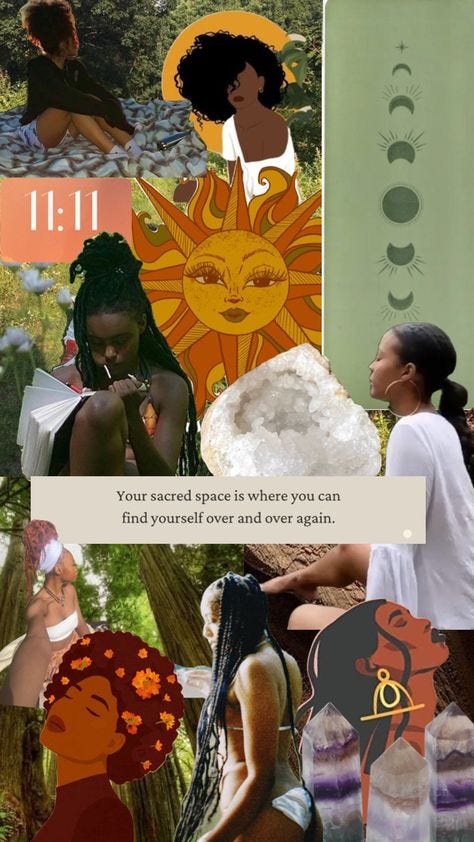I once wrote an entire essay about how I am “soft like pussy,” so please, don’t misunderstand my intentions when I say that I am not a #SoftLife girlie.
The #SoftLife hashtag was popularized by Nigerian influencers like Sisi Yemmie (@sisiyemmie) in 2022 as part of a movement emphasizing ease, enjoyment, and comfort in response to living under the challenges of Nigeria’s economic climate.1 While the concept of the "soft life" has been embraced and adapted by various communities, its roots in Nigerian online culture are not widely acknowledged.
I believe with all my heart that everything Black women say is scripture. I believe in vulnerability, in gentle parenting my inner child, and in letting myself be swept up in the marvels of emotion. As Anaïs Nin once said, “Only the marvelous excites me.” And I believed that so much I tattooed it on my shoulder.
But the version of softness I aspire to isn’t the one found in hashtags and Instagram posts. My softness is more like the one fourth wave womanist, EbonyJanice describes in All the Black Girls Are Activists as a “state of fully seated consciousness.”
“The opposite of softness is a society that forces Black women to be hard and to only feel safe when being firm, being considered harsh, trusting a lurid disposition, and leaning into the sharpness of life. Having to get up from the seat of self to respond, protect, and be safe.” - EbonyJaniece
This resonates deeply with me because I know what it’s like to feel that I can only be safe when I’m on guard, ready to defend myself from a world that doesn’t see me. And yet, as
writes, “Sometimes there is violence on the journey to become seated.”I keep standing on my own and loving how tall i am my spirit used to sit so low inside myself but now I feel her touching her own ceiling saying "HEY! LOOK AT ME!" - Rose J Percy
These lines speak to me of the dialectical nature of softness—the tension between having a fully seated consciousness and standing tall within oneself. These ideas may seem opposed, but together they form a new understanding.
I can’t embody a state of fully seated consciousness until I learn to stand on my own and love the height, the breadth, the fullness of who I am.
For me, the pursuit of softness is the pursuit of liberation. Softness is the rebellious, dangerous, grassroots activism of standing tall while remaining fully seated in myself.
This is where I diverge from the #SoftLife movement as it currently manifests itself on all of my timelines. While I understand and even appreciate the focus on self-care—something that Black women desperately need and deserve—the movement as it exists online has missed the mark. It has been co-opted, diluted, and commercialized in a way that strips it of its revolutionary potential.
Now employed as a shorthand for luxury in western publications like hypebae and Refinery29, the use of “soft life” has become as confused as it is ubiquitous. A quick scroll through the #SoftLife hashtag on TikTok reveals a narrative that’s more about financial privilege, and being in toxic parasocial relationships than it is about the kind of rest Sisi Yemmie was looking for. What began as a movement rooted in Nigerian culture, celebrating rest and the rejection of hardship, has been co-opted by American consumerism. The hashtag consistently fails to acknowledge the barriers that keep Black women on every continent from accessing that softness and leisure—namely, racial and economic inequalities, controlling narratives about Black womanhood, and disparities in mental and physical health.
“I get it because so much of the imagery is material things, but the soft life is a state. A feeling. The soft life for some will be aspirational, but I think it’s best to remember that there are ways that Black women across socioeconomic status can access the idea of ‘laying one’s burden down.’ ” Tenicka Boyd
American capitalism, with its global reach, has the power to absorb and repurpose entire movements, reshaping them to fit the dominant narrative of consumption and individualism. This process not only strips the #SoftLife movement of its cultural and political significance but also perpetuates the very structures that allow Western capitalism to dominate and overshadow the economic realities of Black people in America, Nigeria and other African nations.
What we’re seeing is what Patricia Hill Collins calls “message dilution”—one of the three major suppression techniques employed by white supremacy. This technique involves incorporating concepts and ideas into the mainstream for the purpose of depoliticization.3 It’s an appropriation that transforms a movement meant to be about collective healing and resistance into one that reinforces the same systems of exploitation and inequality it was meant to challenge.
So where does that leave us? For me, the answer lies in soulwork—a praxis intrinsic to my womanism scholarship. Soulwork is finding vocation4 and liberation in self-discovery, self-definition, and collective healing.
Joan M. Martin writes that “naming and understanding our identities is crucial to the honest, straightforward way in which we do our work. To do so is, in fact, part of the work.” This work is an endeavor of discovery, a move from an external perspective toward a more internal approach. Kwok Pui Lan’s theological definition of discovery is about seeing the history of a given non-Western society in its own terms, from its own point of view, rather than as an extension of Western history.
For us, Black women, the constructed knowledge of self emerges from the struggle to replace controlling images of Black womanhood with self-defined knowledge deemed personally important. Far from being a narcissistic or trivial concern, this placement of self at the center of analysis is critical for understanding within the scope of other relationships. When Black women define ourselves, we clearly reject the assumption that those in positions of power are entitled to interpret our reality.
The controlling narratives applied to Black women are designed to confront and control the aspects of our behavior that threaten existing power dynamics—through binary thinking, oppositional differences, objectification, and social hierarchy. Standing up for oneself, standing tall within oneself, is another way to perform “self-definition,” which is a major step in soulwork and in actually living a soft life without the hashtag.
This is the kind of softness I seek—the kind that EbonyJanice describes. The kind of softness that Robert writes about in his essay about Toni Morrison. A softness rooted in soulwork, in the labor of self-definition, in the radical act of claiming my own life and my own softness on my own terms.

I am not here to dismiss the #SoftLife movement entirely. I believe in the importance of rest, relaxation, and self-care. But these things cannot be disconnected from the larger context of Black women’s lives. They cannot be separated from the systemic barriers that make true softness difficult to attain. Softness, for us, must be about more than just loungewear and luxury. It must be about self-definition, about the advocacy of standing tall and staying seated within ourselves. It must be about soulwork.
In a world that demands our hardness, our vigilance, and our sacrifice, claiming softness is an act of resistance. Define it on your own terms. And remember that this journey is as much about standing tall as it is about sitting fully within yourself.
Love y’all. Mean it. If you love me back, buy me a book!
-B
https://www.reuters.com/world/africa/nigeria-central-bank-says-it-is-concerned-about-naira-value-2022-07-30/
I consistently advocate for reading Collins’ work Black Feminist Thought.
vocation in this instance refers to a person's employment or main occupation, especially regarded as particularly worthy and requiring great dedication








I teared up at the first half of it, which made me flounder through the back half. Thank you for these words and I'm going to have to keep coming back to this piece friend.
This was so beautiful to read and dissected beautifully.